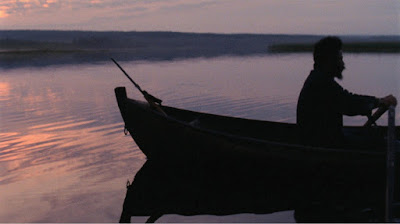Reflections from a Young Movie-Goer

Documentaries,
more so than other films, are perfect manipulators of reality. Their
direct intersection with real life bears a resemblance to news
reports or advertisements, all three have to convince their audience
of this version of events, in the hopes they might act upon the given information. But unlike these other two forms of media, Documentaries
have a filmic scale that gives one the opportunity to become more
fully immersed in the worlds that they present. One expects some
complexity from this, if not less bias, so that their worlds (and
arguments) become more convincing. In most cases, Documentaries that
do cherry-pick the features of their worlds are overtly political,
think Winter on Fire: Ukraine's Fight for Freedom (2015) or the work
of Michael Moore. In these instances, the films are excusable for all
their flaws or tipexed-out bits because their rhetoric has a more
direct urgency to our own world. But for Minimalism: A Documentary
about the Important Things (2016), in
the absence of complexity or political gravity, we have, instead, an overlong
advertisement.
It
opens by bombarding audience with wobbly Cloverfield-esque
footage of black friday, people with PhDs telling us how
consumerist we've become, and a timelapse of a gigantic Best Buy,
punctuated by a neon-lit permanence, getting swarmed by a Malthusian
mass of meaningless, existential people-blurs. Then, from this philistine,
soulless world two trendy prophets arise with the answer. Like all
good entrepreneurs they have a back story (which shows emotional
involvement); they were living
inauthentically and were unsatisfied with their corporate existences.
But then they found the light, a cure which they could communicate to
the masses; minimalism. The doctrine of minimalism is to renounce
mass-consumerism, and live with only the things which add value to
your life. They are the popes of this movement, giving themselves the
snappy moniker of "the Minimalists", and they've happened
to write a book about it which you can buy. They're nice guys who
travel across America giving talks and don't care if there's only two
in the audience because they've still been able to "spread the
word". They're insistent that you know they prefer hugging over
handshakes. And they want you to buy their book. But wait, you ask
yourself, surely it can't work if you have a wife and kids. Think
again, they say, this guy has a wife and kids and still does
minimalism. But wait, it can't actually improve your mental and
physical wellbeing, can it? Think again! This woman has a
debilitating condition, but when she applied minimalism, it cleared
it up instantly! But wait, these guys are just in it for the money,
right? Wrong! This guy's mum died of cancer, and he's on his own sort
of spiritual journey to appease her vengeful spirit. This is the
extent of the documentary, it's an advert.
It
surrenders any factual coherence in favour of a weak plot that
follows "the Minimalists" on their tour, stuffed with
little touches of characterisation that attempt to prove their
humanity, that they care deeply about your wellbeing. They act like a checklist for the successful business types of the 21st century; laid back, casual but trendy clothes, inspiring talks, making friendliness a part of their brand, trying to instil their product with humanitarian purpose. It's almost laughable how many times they're shown telling people that they're "huggers" rather than hank-shakers, shoehorning it into their brand appeal. It's made worse
by the fact that there's a lot to salvage from their message, perhaps
a much more noble documentary which takes a journalistic approach to
the topic. It plays into the whole phenomenon of commodified
spirituality, alongside the likes of mindfulness and yoga, which
present themselves as icky trends for Middle Class consumption that
put off outsiders with their cultish, dogmatic presence. The same can
be said for environmentalism and healthy eating, whilst their
branding makes them easier to consume amongst those who can, they
remain shallow, overbearing and unaffordable to those who can't. And
rather than showing minimalism as a political, collective activity,
it's sold directly to the individual under a guise of political
effectiveness. This faux-politics becomes glaringly obvious at one of
their talks, where a homeless-looking-black-man in the audience
spouts some sort of anti-establishment people power wisdom, an ugly
Hollywood stereotype laden with racism, and to this the two
minimalists, with a businessman-like cunning, agree and swiftly
assimilate it to their cause, without developing the point any
further.
The
problem is that this is an exploitative mode of Documentary-making,
because it poses its anti-consumerist message in the form of a
consumable. It highlights a tendency towards virtue signalling in
America, something tied up with a perverted cross-breed of Capitalism
and Religion, where badges-of-goodness are more important than
rational thought. This is why we need complexity in Documentary
making, so that it avoids dogmatising its subject matter. Even if the
result is still largely one sided, the audience can be shown rather
than told. Minimalism fails
to reach any substantial layer of complexity or factual exploration
which leaves it a shallow advertisement, too easy to step in and scatter into nothingness.


